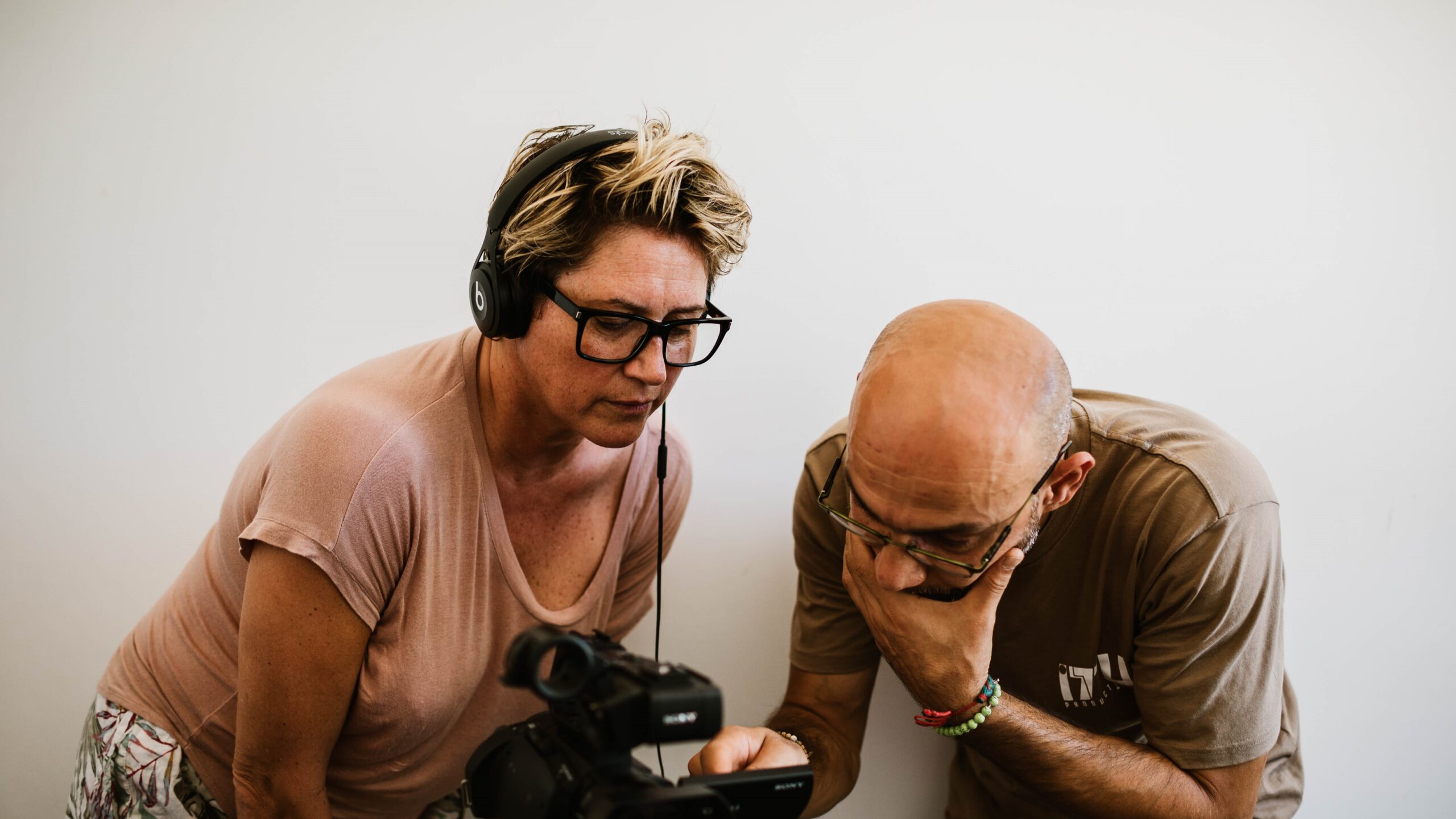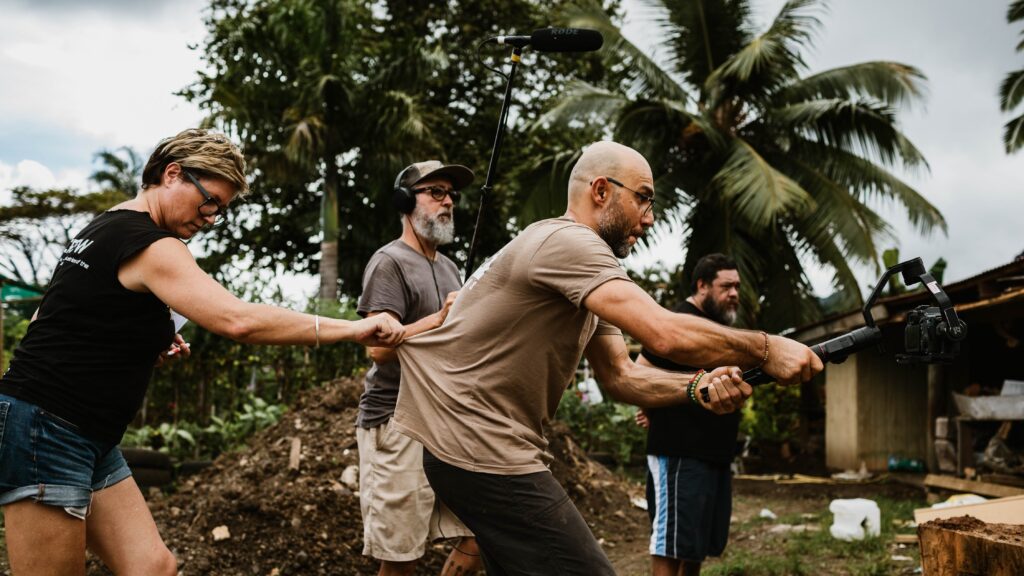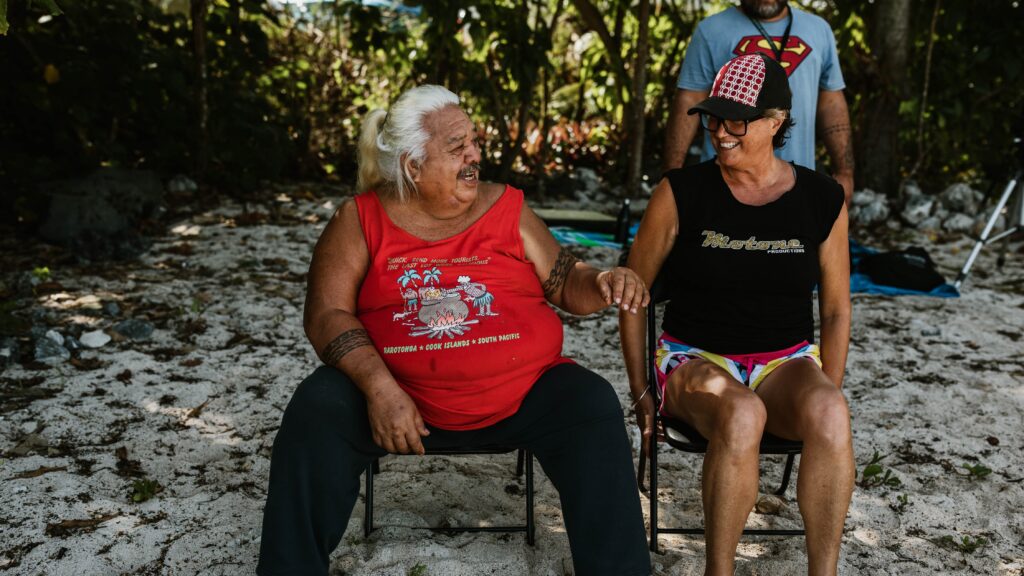Celebrating our treasures
Saturday 28 May 2022 | Written by Melina Etches | Published in Features, Weekend

Film Producer Glenda Tuaine and crew on set. PC: TAONGA. 22052316
A film documentary on celebrated carver Mike Tavioni and his wife Awhitia has inspired a Cook Islands creative to rediscover her passion for storytelling.
Experienced producer and creative Glenda Tuaine is passionate about making the creative industry out of the Pacific an international wave.
Together with her husband Maurice (Mo) Newport, they are Motone Productions, a creative production company, and have delivered events internationally that build arts careers and the industry.
In 2019, Tuaine received the Creative New Zealand Special Recognition Pacifika Arts award which recognises an individual whose work, influence and commitment have raised the standards, expectations and reputation of Pacific arts and artists.
She successfully applied for funding from the Pacific Islands & Communications (PIC), an American organisation based in Hawaii, to produce her very first short film documentary.
Her documentary TAONGA: An Artist Activist will make its New Zealand premiere at Maoriland Film Festival 2022 on July I.
The film celebrates creative talent in the Cook Islands focusing on local cultural icon, artist and activist, Mike Tavioni. Tavioni and his wife will attend the premiere.

Not only did Tuaine produce the film, she directed and managed it “with a beautiful team of people”.
“I want him (Tavioni) to be heralded, and for him to experience this film, it is about him,” says Tuaine.
“Tavioni is a taonga (a treasure), a treasure of our own and is of the ability to be an ‘artist pure,” says Tuaine, who has spent many, many years talking to Tavioni and has always been fascinated by his knowledge.
“I feel incredibly honoured to be able to make a film about Mike and Awhitia.”
Through her experiences with Tavioni, she has known him to an incredible voice for politics, knowledge, culture and the community.
“He takes things and really does his own style of research on things, but he’s incredibly thorough,” she says.
“He’s unafraid to be a voice when others might not actually want to vocalise what’s going on, and I really admire that, because I think we need more of that in our community, and Mike’s been that since he was young,” says Tuaine.
Filmmaking is such an incredibly strong way of being able to capture and maintain a really good record of “where we have been, what we are and where we are going to”, says Tuaine.
“What I do see here is that we don’t make films about our own people, we tend to think that if films are made, then they’re made by people overseas ... and this film is made by a completely all local crew.
“We have the capabilities here, but you just have to find the right combination of people.
“And we should be using people in our community, celebrating our own.”
Her film is to be screened internationally. Tuaine very quickly had to learn all about the international rules and regulations behind filmmaking. They involve understanding errors and commissions insurance, trademarking and understanding the actual business.
“If you want to make film you actually really do need to understand the international market place,” she says.
And making a film cost money, “a lot of money”, says Tuaine and adding, it’s expensive if you want to do it right.
To get funding for a film you have to write a heap of stuff, she adds.
Tuaine had to also reach out for physical sponsors to assist with film and is grateful for the help from the “wonderful people” through the Give a Little Facebook page and local bank BCI.
“I learnt so much, it’s the community that assists people to get to where they want to go to, and that’s what we’ve got to learn here, the Pacific community is helping me make this film,” she says.

Despite the interruptions caused by the Covid-19 pandemic, filming started in early 2020 and ran through to the end of that year.
The tougher part was the post production phase which took another year and involved the composition of original music. “I wanted original beautifulness,” says Tuaine.
She explains post production also involves level out sound editing which takes a lot of time. “Transcribing absolutely everyone I interviewed to see what relevance they have to the story, what emphasis I needed, then time code all of that (took a lot of time).”
A rough cut goes off to the executive producer who looks at it and gives feedback, “then you go into a fine cut everyone’s interviews and go through them and work out the pieces you want to use”.
Tuaine also had to keep up with the paperwork as funding agency, the Pacific Islands & Communications (PIC) wanted to see the deliverables, to see the rough cuts, the contracts with the team and the budget.
“There are also many rules and regulations around film, so you can’t just go out and show it, you have to wait and do it according to your executive producer.”
To be a filmmaker, a lot of research and preparation is involved. “You have to have a really clear picture of what you want people to say, what it is that you’re trying to do, even before you begin the film … you have to understand what your film treatment is, how the film will move …
“A documentary maker is a storyteller, you’re there to tell peoples stories,” she says.
Tuaine is thankful for mentors like Lala Rolls, a documentary film maker in New Zealand and Cook Islander Karen Williams who constantly gave her “rock solid advice”.
Part of being a filmmaker she says, is “you have to be open to people’s advice – don’t think you know everything, be prepared for people to give you feedback and advice”.
“There’s no harm in humility, this has been such an incredible experience. There’s so much more to learn so much more to do and many more stories to be told,” says Tuaine.
The film also features local artistic elements, Mii Taokia created animated sections, Teariki Ra (cameraman), and Jim Perkins, Mo Newport and Rudy Aquino have composed music for it.

“It’s all original and that makes me really proud, there is a lot of graphic and artistic elements to the film that everyone has contributed to.”
The film is a “snapshot” of Tavioni’s life – “a man who does a prolific amount of artistic work that many people don’t know about. And he just keeps on going and going … that should be heralded, not scorned,” says Tuaine.
“He has the richness of life. Mike does what he loves and what he is passionate about, and lots can be learned from that. He has been told off, but he perseveres through all of that and that’s powerful.
“Mike’s such a good person to work with, and has many jewels and pearls of wisdom.
“He’s not getting any younger, his heart is in the community, and his abilities are to be able to be that taunga artist for us that teaches and shows, and should be referred to.”
While talking about the future of filmmaking in the country, Tuaine says the younger ones should be given the opportunity on having comprehension and understanding of how to make their own films, how to write their script, their own songs to perform and how to tell their own stories.
And she believes that there is a new generation in the Cook Islands that are way better in understanding the need and the importance of being able to be creative and to be able to speak about our own stories.
“I’m all about the next generations. We need to be role models, but we need to be brave enough to tell the stories that should be told and not shy away from controversy or happiness, or things that sometimes haven’t been told properly,” says Tuaine.
“And to embrace new ways of being is just as good as keeping a hold of our traditions. We need to open up a little bit better to what needs to be said in the creative areas.
“We’ve got to get our young ones in that zone. We’ve got beautiful stories to be told here, our young people deserve the right to be able to do it and freely as well without bias and judgement, to be allowed to say the things they want to say…”
Tuaine has had an incredible journey and will keep on pushing through. She has a vision, knows her stuff, knows where she’s going and what she wants to do.
“The only reason I know that is that I’ve had 35 odd years in the industry of arts and I know how to do this stuff because people were kind enough to mentor me along the way, kind enough to give their time to me.
“This film means so very much to me as it signifies how film is the vital sinew that has to hold our history/herstory so that generations to come know how we grew, what is important and can learn from our wins and our losses. It illuminates those times forgotten and captures us now.
“I could not have made this film without the support of a community of people who believe in the Cook Islands Creative Industry.”















































